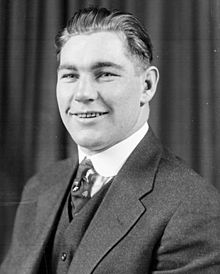Les Darcy
| Les Darcy | |
|---|---|
 |
|
| Statistics | |
| Real name | James Leslie Darcy |
| Nickname(s) | The Maitland Wonder |
| Rated at | Middleweight |
| Height | 5 ft 6 in (1.68 m) |
| Reach | 71 in (180 cm) |
| Nationality | Australian |
| Born |
31 October 1895 Stradbroke, near Woodville, New South Wales |
| Died | 24 May 1917 (aged 21) Memphis, Tennessee, US |
| Stance | Orthodox |
| Boxing record | |
| Total fights | 56 |
| Wins | 52 |
| Wins by KO | 32 |
| Losses | 4 |
| Draws | 0 |
| No contests | 0 |
James Leslie "Les" Darcy (31 October 1895 – 24 May 1917) was an Australian boxer. He was a middleweight, but held the Australian Heavyweight Championship title at the same time.
Les Darcy was born near Maitland, New South Wales. He started boxing as an amateur at age fifteen and quickly turned professional. He won his first sixteen fights before challenging the veteran Bob Whitelaw for the Australian welterweight title. Darcy lost the twenty-round decision but, in a rematch, knocked Whitelaw out in five rounds.
Darcy graduated from regional bouts to fighting in Sydney Stadium, in Rushcutters Bay, and promoters began to import talent to challenge him. He lost his first two fights in Sydney, one by decision and one by foul, to America's Fritz Holland. The next year Darcy faced another American, Jeff Smith, in what was considered a contest for the Australian world middleweight title. When Darcy complained of a low blow at the end of the fifth round, the referee believed that Darcy did not want to continue and awarded the decision to Smith. In a rematch, Darcy was awarded the victory when Smith punched him in the groin.
As Australian world middleweight champ, Darcy defeated such top-flight visiting Americans as Eddie McGoorty, Billy Murray, Jimmy Clabby, George Chip, George "KO" Brown, and Buck Crouse, as well as knocking out Smith and Holland in rematches. Darcy's opponents are said to have admired his courage, stamina, and punching power. In 1916, Darcy knocked Harold Hardwick out to capture the Australian heavyweight title.
Darcy became embroiled in the politics of conscription during the First World War, and left Australia for the United States to avoid the aggravation. He died on 24 May 1917 from septicaemia and medical complications, which was speculated to be from dental work he received to replace teeth that had been knocked out during a bout.
...
Wikipedia
